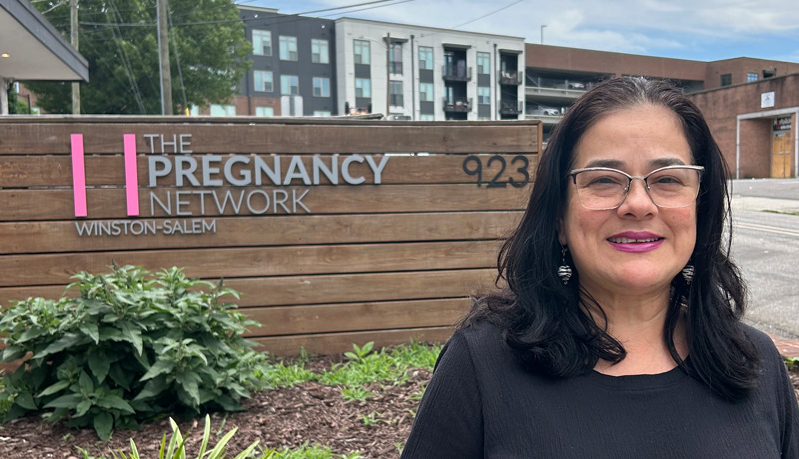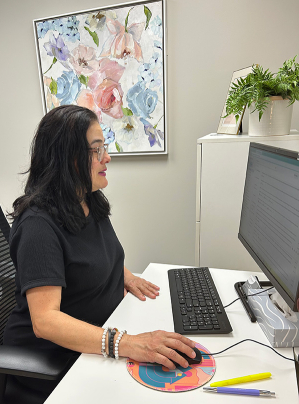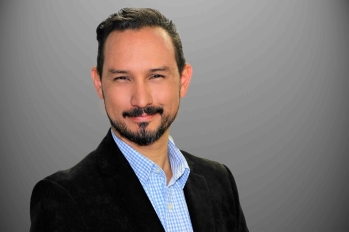
The Triad region of North Carolina is an epicenter of medical innovation, yet even in the midst of our research universities, sprawling medical complexes, and large hospitals, there are countless women who are unsure about where to go and who to turn to when facing an unexpected pregnancy.
Many of these women are looking for help, resources, and advice, and an increasing number of them are looking for someone who can offer support and care in a language other than English.

At The Pregnancy Network, located in North Carolina, approximately 25 percent of the women we serve are native Spanish speakers, and that number continues to grow each year. These clients come to us, often through referrals from friends, unsure of how to navigate a system that they don’t understand in the midst of challenging and scary circumstances.
As the Spanish Client Services Manager for the center, I make sure that these women and their families are welcomed and informed when they walk through our doors. When women visit our center for the first time, they are met with compassion and care. I listen to their stories and tell them about the range of services our facility provides, from ultrasounds to STD (sexually transmitted disease) testing to peer advocacy and mentorship.
I listen and answer their questions. Most importantly, I do all these things in the language they are most comfortable speaking.
Growing up in Venezuela and later immigrating to the United States, I know firsthand the challenges of navigating everyday life in a language that you don’t know or are still learning. It can be overwhelming, to say the least.
Several years ago, I began volunteering at the pregnancy center as a way to use my experiences and also bilingual abilities to help local women facing unexpected pregnancies. At the same time, I worked as an Instacart driver, and traveling my local roads every day only heightened my awareness of the needs of those around me.
The women in our local Spanish-speaking community deserved a vibrant support network and resources.
In these moments, I thought about the support I had when raising my own children. I knew that the women in our local Spanish-speaking community deserved a vibrant support network and resources. I knew that no matter a woman’s language or background, the fear and uncertainty of an unexpected pregnancy is nearly universal, and it can be overwhelming without help.
As a volunteer interpreter at the center, I helped our Spanish-speaking clients navigate medical forms and requests for assistance. As my relationships with our clients grew, I was able to learn more about the incredible stories and share more about the resources that we offered, including mentorship programs and baby items like diapers, wipes, clothes, and car seats.
Soon, we began offering regular pregnancy and parenting classes in Spanish so that we could help women and families at every stage in their journey. We also worked to connect them to other bilingual service providers to help with needs ranging from food and groceries to housing and beyond.
When I was given the opportunity to turn my passion for volunteering into a full-time role with the center, I jumped at the chance to serve more women.
Language should never be a barrier that women encounter.
The research shows that women facing unexpected pregnancies already face incredible pressure to choose abortion, and many times financial and other stressors play a role in their decision. In the midst of these challenges, language should never be a barrier that women encounter.
To other pregnancy centers, churches, and community organizations that serve women facing a crisis or unexpected pregnancy, I’d encourage you to consider offering Spanish-speaking services if you’re able to do so. Offering support in the language she’s most comfortable speaking is a beautiful way to ensure every woman can access the essential resources she needs to choose life for her unborn child and have hope and help during her pregnancy and parenting journey.
Irina Perez is the Spanish Client Services Manager at The Pregnancy Network in Greensboro and Winston-Salem, North Carolina. Irina is from Venezuela, South America, and has two children. One of her favorite places to go with her family is the beach. Irina has a marketing and media production degree from Universidad Isaac Newton, Barquisimeto-Venezuela, and a Medical Interpreter Certificate from Forsyth Tech in Winston-Salem, NC, United States of America.





